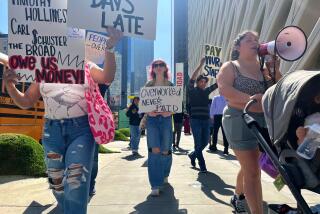Century City janitors’ strike spotlights workers’ plight
Over the past week, a drama has been in progress outside two of the city’s most expensive office buildings, 2000 Avenue of the Stars and the Century Plaza Tower in Century City.
Two weeks ago, 16 of the janitors who clean the high-rises that are home to some of the world’s richest talent agencies, financial service companies and law firms were laid off. Their colleagues walked off the job in sympathy, and other members of SEIU, the union that represents them, have been staging a variety of protests, including a hunger strike that ended Friday. They’re demanding that JP Morgan Chase, the $2-trillion bank that owns the buildings and paid out billions in bonuses to its executives last year, hire the 16 back.
The bank shrugs off the situation, pointing out that it contracts with ABM Industries to clean the towers. “The dispute is between a vendor and [its] employees, not Chase,” corporate spokesman Gary Kishner wrote in a statement. Meanwhile, the city’s news media have handled this story mainly as an exasperated tale of inconvenience and traffic jams for people going to and from work, rather than as a story about 16 people, many of them single mothers, who were tossed out on the street by a profitable company seeking to cut costs. It’s hard not to be struck by the contrast between that lack of empathetic generosity and the courageous solidarity shown by their 57 fellow janitors who risked their own jobs in an economy with rampant unemployment. These people make $13.50 an hour; the tenants in that building have blazers on which every button costs three times that.
Publicly traded ABM is one of the country’s largest maintenance contractors, with annual revenue of $3.5 billion. It earned $855.5 million in the second quarter of this year and paid its stockholders their 177th consecutive quarterly dividend. ABM also has the requisite flashy website that enumerates its corporate principles. Among them is “respecting our employees.... ABM treats everyone justly and fairly. When employees are happy, we know they’ll do their best for our customers.”
Tell that to one of the fired single mothers trying to figure out how to feed and house her three children, as well as her elderly, diabetic mother who depended on the check earned by cleaning executive washrooms. She isn’t happy. Tell it to one of her co-workers, Zoila Sosa, whose 17-year-old son, Jorge will forgo college enrollment — and the future his mother dreamed for him — to seek work to support their household. “Sometimes she cries by herself, alone. We’re scared,” he told an interviewer this week. Odd, that doesn’t sound like she feels either happy or fairly treated.
Rosa Mirna Cruz, who cleans at 2000 Avenue of the Stars, told a reporter, “They are leaving us and our families without food and without a way to pay for rent.” That doesn’t sound like she feels her co-workers are being treated justly.
Over the last decade or so, we’ve all been habituated to the sorry spectacle of profitable companies improving their balance sheets — and, thereby, their executive bonuses and stockholder dividends — by tossing ordinary working people out of their jobs. We used to consider that immoral and unjust, and millions of white-collar workers have suffered along with hourly wage earners as management and investors have profited from this wanton destruction of the social compact. In California today, more than 1 in 10 workers are jobless, as many employers squeeze longer hours and ever-greater productivity out of the fearful employees they retain.
That’s one sort of problem, but another — far more fundamental — arises when our generalized anxiety and self-absorption blinds us to the fact that only a city without a conscience worries about time lost in traffic rather than the fate of hardworking men and women. These janitors ask nothing more of us than to support their families by doing the backbreaking job of cleaning up after some of the wealthiest and most privileged people in America. In return for their labor, they have been thrown out on the street, like the refuse their putative employer profits by collecting.
Much of what’s happened at Century City this week has been, as several sneering commentators have said, a kind of theater. It’s well to remember, though, that one of our oldest forms of drama is the morality play.
More to Read
Inside the business of entertainment
The Wide Shot brings you news, analysis and insights on everything from streaming wars to production — and what it all means for the future.
You may occasionally receive promotional content from the Los Angeles Times.










